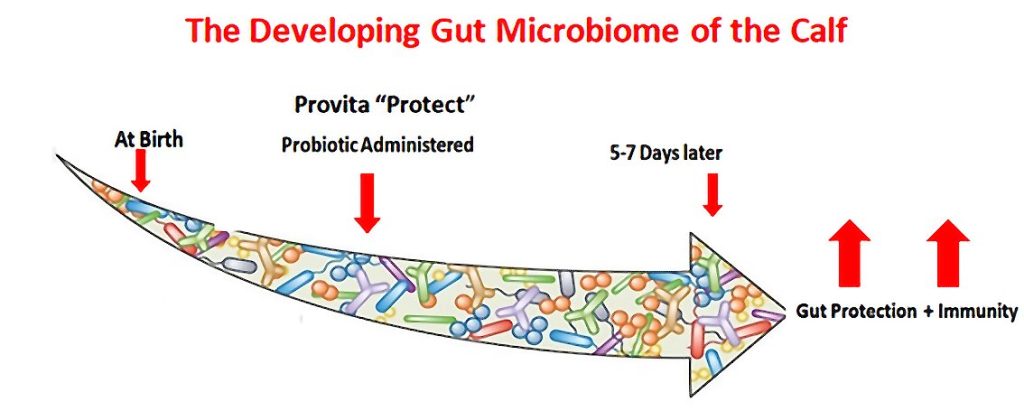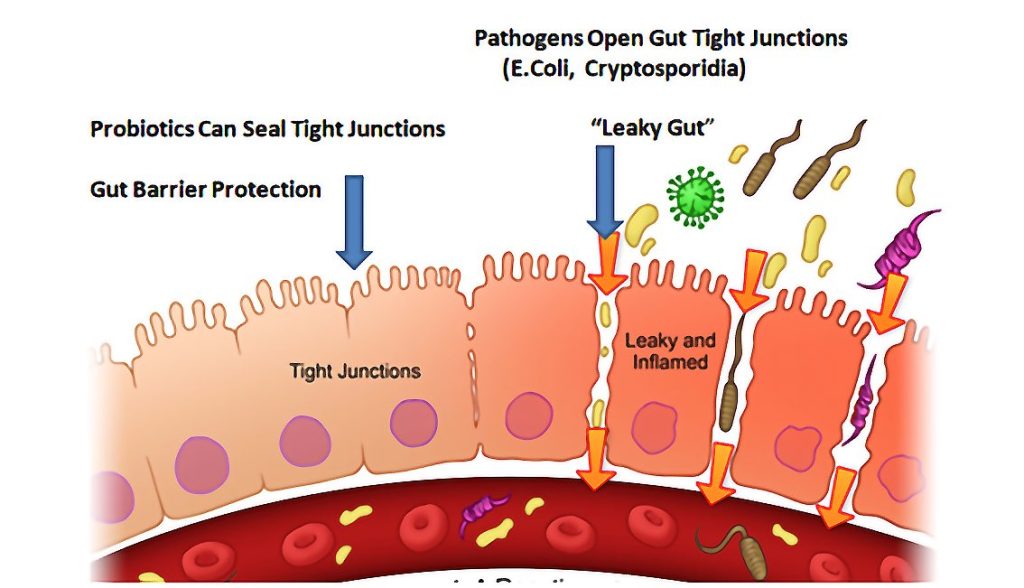By: Dr T.B Barragry PhD MSc MVB MRCVS
Probiotic Actions
Very significant advances have been made in clarifying the scientific mechanism of action of probiotics with respect to their interactions with the gut microbiome and on the development of immunity in the gut barrier itself. These interesting new probiotic mechanisms are largely threefold:
- Effects within the gut on the microbiome
- Effects on the gut barrier itself, including sealing of tight junctions, increasing trans-epithelial electrical resistance (TEER), prevention of leaky gut syndrome, stimulation of local gut immunity and the release of natural anti-microbial substances such as, bacteriocins and more
- Immunological effects in the gut, release of chemical signalling agents leading to heightened immunity in the gut mucosal barrier, and in other organs such as the lungs
The Gut Microbiome and Immunity
The gut microbiome (the microbes in the gut) contains trillions of commensal microbial cells, (good bugs) which outnumber the entire population of tissue cells in the body. Recent biomedical research has established that the gut is the largest immune system of the body, thereby making the management of it essential for the immune system, productivity and health. Chemical signals from the commensals in the gut microbiome enhance immune status locally on the gut wall, and also stimulate immunity in other tissues such as the lung.
This gut microbiome (as the largest immune organ) is almost sterile at birth and thus it is no coincidence that the newborn calf possesses little or no immunity and hence is highly susceptible to neonatal infections. A clear immunological link exists therefore between the gut microbiota, the immune system and the presence or absence of neonatal disease. Augmenting this gut microbiome with probiotic organisms at birth is one way to enhance the gut commensal population which steps up immunity and thus helps to prevents E coli infection.

Short Chain Fatty Acids (SCFA) are only one of the chemical signalling methods used by commensal bacterial in the gut to trigger immune responses within the gut itself, and also within other body compartments such as the lung. This is known as the immunological “gut-lung crosstalk”.
How to Use Probiotics
Although the gut microbiome and the immune system are intimately connected, this dual system can only be effectively utilised if probiotics are given prophylactically to all young animals immediately after birth. A pre-emptive strike in other words. Waiting for disease to occur and then endeavouring to deal with it by therapeutic “firefighting” is a waste of time, money and also of the animal’s health and long-term productivity. Antibiotics will always be needed and will always be necessary to treat serious outbreaks of clinical infectious diseases. What is at stake here is reducing the frequency of their usage, and indeed, if possible, to prophylactically head off outbreaks of disease before they establish. The usefulness of any antibiotic is inversely proportional to the frequency of its usage. The regular application of oral broad-spectrum antibiotics is a particular problem insofar as it is a very blunt instrument, which affects not only gut pathogens, but also the resident population of beneficial commensals. Oral broad-spectrum antimicrobials in effect “asset strip” the gut microbiome of more organisms than is necessary, including the vital beneficial ones, from which the microbiome may take time to recover.
This indiscriminate oral antimicrobial usage can be regarded as a “subtractive approach” in terms of the gut microbiome, whereas seeding the gut with beneficial organisms with probiotics is an “additive effect”
Prevention is better than cure, and all newborn animals (healthy or otherwise) can benefit from receiving quality, proven and authorised probiotics early in life. Probiotics contain live bacterial organisms (Lactobacilli and Enterococcus) which crowd out E coli and other pathogens from the gut, prevent them adhering to the gut lining, neutralising their toxins, and killing gut pathogens with natural antimicrobial substances called bacteriocins. In addition, probiotics seal the gut wall to pathogens, (by closing the Tight Junctions in the gut wall), they stimulate local immunity in the gut, and produce chemical messengers (fatty acids) which travel to other body compartments, increasing local immunity and antibody (IGA) formation, particularly in the lungs.

Provita Protect Probiotic as a cost-effective investment:
Provita Protect is the only authorised, licensed and proven probiotic for calves on the UK and European market. It has been authorised for use in E. coli calf scour by the VMD on the basis of acceptance of its evidence –based field trial results, and its proven efficacy against E. coli scour in calves. In this regard, it is a unique probiotic.
During clinical trials with Provita Protect the following results were documented in the Clinical Expert Report which was prepared for submission to the regulatory authorities, and which resulted in the successful registration and authorisation of the product.
Probiotic Effects in Calf Field Trials (Lactobacillus Acidophilus + Enterococcus Faecium)
Results from calf field trials for product registration for Provita Protect:
- 83% less incidence of calf scour
- 70% less incidence of calf respiratory disease
- 78% less incidence of scour and pneumonia
- +31% increase in Average Daily Gain (ADG)
- +10% higher weights at weaning
Mention was made earlier of the immunological “cross talk “between the gut and the lungs. In field trials for the purposes of product registration, Provita Protect was seen to reduce the incidence of pneumonia in treated calves. In these field trials, calves treated with Protect showed not only a 78% reduction in calf scour incidence but also a 70% reduction in pneumonia occurrence. It is well established that scouring calves are twenty times more susceptible to respiratory disease. However, although shown to be effective in preventing respiratory outbreaks, this is not an official licensed use of the Provita product.
(Dr Barragry acts as independent consultant to Provita Eurotech ltd)
